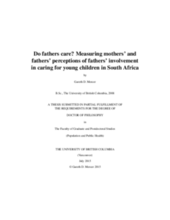Abstract
Fathers can be an important source of support for children. However, in South Africa, many children do not reside with their biological father and little is known about fathers’ involvement in children’s care. A questionnaire that reliably measures fathers’ involvement and is adaptable to varied residential arrangements would facilitate future population-level research. We explored whether children who reside with their biological father have better health than children whose fathers live elsewhere. We also assessed whether a questionnaire adapted from surveys in the United States would reliably measure South African fathers’ involvement in caring for infants. With data from the 1998 Demographic and Health Survey, we used multilevel logistic regression to estimate associations between father-child co-residence status and four child health outcomes: breastfeeding for 6 months; immunization completeness; recent acute respiratory infection; and recent diarrhea. We found that children with non-co-resident fathers were not at higher risk of these health outcomes. As part of a separate longitudinal cohort study in the Western Cape, we had a sample of mothers complete questionnaires about their infants’ fathers’ care involvement when infants were 2 weeks, 16 weeks and 6 months old. Using Item Response Theory models we estimated the distribution of the fathers’ levels of involvement in five hypothetically distinct modes of care. We used total information functions to assess the precision of father involvement estimates. Most fathers were reportedly spending time with infants, doing routine care activities and providing financially. Fewer fathers were involved in important care decisions or doing household chores. For most fathers in the sample, the questionnaire gave precise estimates of involvement in three modes of care: Accessibility, Direct Caregiving, and Practical Support for Mother. In contrast, items measuring Material Provisioning and Responsibility gave imprecise estimates for the majority of fathers. Our findings reinforce existing evidence that co-residence status is an inadequate proxy for care involvement. Future population-level research into fathers’ influences on children’s health should directly measure fathers’ care practices. With further validation, the questionnaire assessed in this study could be used to measure the more direct modes of infant care.

